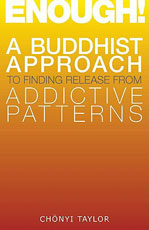Myths and Realities about Happiness and Pleasure
"We often experience a desperate wanting and desperate aversion towards ourselves, towards our addictive patterns, and towards the object of our addiction. This comes about from a common and basic misunderstanding about the differences between happiness and pleasure. Pleasure comes from our senses when the contact with some object feels good. It is not the feeling good which is the problem, but wanting to hang on to that feeling. We become unhappy when we have no access to that nice feeling. If we have access to whatever give us pleasure, then we grasp it and try to hang on to it. The more we want it, the more grimly we try to hang on to it. Unfortunately, however grimly we hang on, what we want does not and cannot last forever. Buddha understood this. He called it the suffering of change. What he meant was that what seems to be happiness is already, from its very first moment, affected by the fact that the object bringing this pleasure will eventually change. In addition, our own bodies and minds are constantly changing. This is called impermanence.
"Imagine, for a moment, that you are on the beach on a hot day. The water is so inviting that you can hardly wait to drop your towel and run into it and cool down. What pleasure, then, will come from swimming or soaking in that cool liquid. It feels as if this pleasure will last forever. But the reality is that after a while you begin to feel waterlogged. The water is no longer inviting. Now it is your towel that is going to give you pleasure. Fine. But after a while, you get hot again. Then the water is so inviting once more . . . until you feel waterlogged, and so on. Mostly we do not get emotional about the fact that on a hot day at the beach we are likely to enjoy getting into the water when hot and out of the water when cold. We can accept the changes.
"What happens, then, if you decide to go to the beach on a hot day and, after an hour, an unexpected cold, rainy change blows up turning the glassy waves into a gray, choppy mess and soaking your towel in the bargain? Suddenly the pleasure of being on the beach has gone. How will you react? If you desperately wanted a typical beach day, then you are likely to be angry. The more you wanted the beach day, the more upset you are likely to be. You are angry because what you thought would last has not lasted. It was impermanent. What is reality: the dream of a perfect beach day or the changing of that perfect day into something else? Whatever our pleasures may be, they are subject to change. There is really not much point in getting upset.
"Addiction is about wanting happiness, but the happiness that comes with addiction is necessarily a temporary, impermanent pleasure. We get trapped into addiction because we want this apparent happiness forever. We cannot have it forever and yet we still yearn for a lasting happiness. What does this mean? Is it possible to find a lasting happiness? We will leave that question to later chapters.
Making the Most of Pleasure
"It is not wrong to be happy and appreciate the pleasures of life. The secret is to enjoy these things while we have them and not to be resentful when they naturally pass. We can set up our lives so that happiness and pleasure are more likely. For example, keeping the house reasonably clean and neat means we enjoy it more often. We will enjoy it even more when we do not get upset when the house naturally becomes untidy and dusty again.
"Making the most of pleasure means having equanimity towards that as well. If we give ourselves time to practice equanimity, then we find that we become more aware of what we are thinking and how we are reacting to our inner and outer worlds. This gives us a basis for identifying the triggers which throw us into the compulsiveness of addiction. If we can identify the triggers, then we have much more power to undo the negative, compulsive patterns and to replace these with something else."
